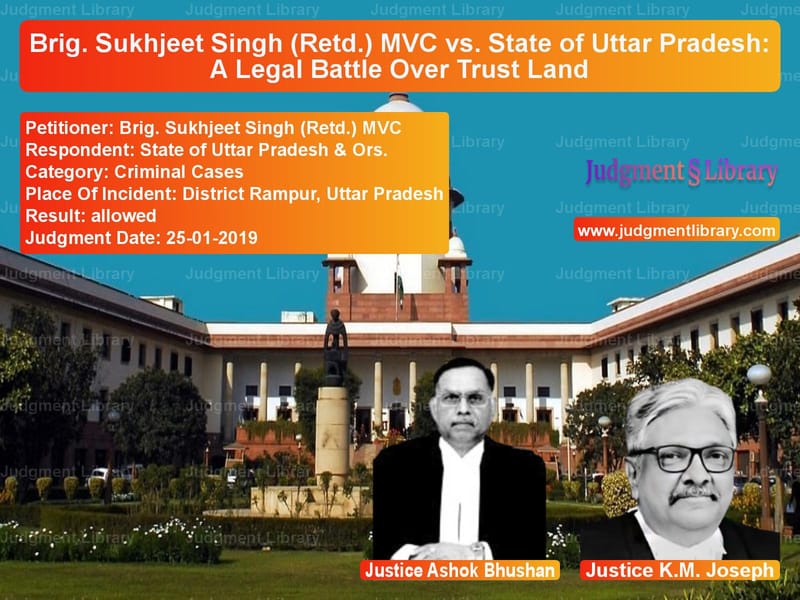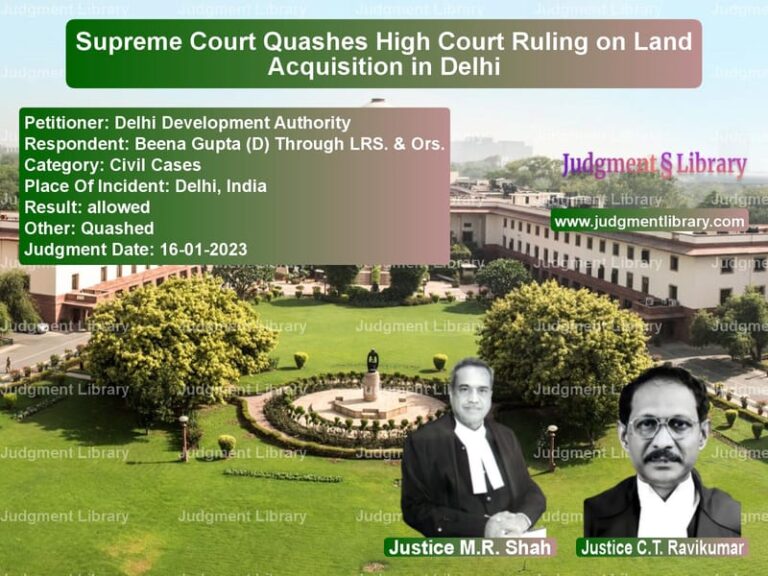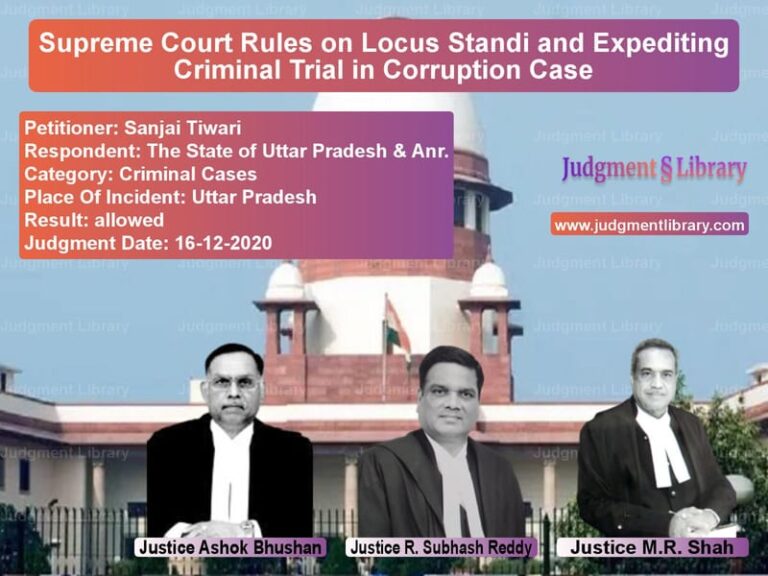Brig. Sukhjeet Singh (Retd.) MVC vs. State of Uttar Pradesh: A Legal Battle Over Trust Land
Brigadier Sukhjeet Singh (Retd.), a decorated war veteran, found himself embroiled in a prolonged legal battle that spanned decades. This case, originating from a dispute over the sale of trust-owned agricultural land, raised serious questions about fraudulent transactions, trust management, and criminal liability. The Supreme Court was eventually called upon to adjudicate whether Singh, acting as a trustee, was rightfully convicted under criminal law or whether his actions were within legal bounds.
The legal battle traces its roots to the sale of land belonging to the Scinde Horse Regiment Trust, a welfare trust formed in 1959 for the benefit of ex-servicemen. The trust owned vast agricultural properties, including land in District Rampur, Uttar Pradesh. A dispute arose when two individuals, Shri Hargursharan Singh and Shri Fateh Singh, accused the trust representatives of misrepresenting their rights and taking payments without executing the promised sale deeds.
Background of the Case
The trust, initially established for the welfare of ex-servicemen, was governed by a set of trustees. The office of Chairman was held by the Commandant of the Scinde Horse Regiment. On October 18, 1989, a new Trust Deed was executed, formalizing the rights of trustees, including the right to convert or sell trust properties with unanimous approval.
At the same time, a resolution was passed (Resolution No. 112), authorizing four individuals, including Brigadier Sukhjeet Singh, to negotiate and execute the sale of the trust’s agricultural land. Following this resolution, an MOU (Memorandum of Understanding) was signed with the complainants, outlining the terms of the land sale. It was stipulated that payments were to be made only via bank drafts or pay orders favoring the trust.
On July 3, 1991, the complainants alleged that they paid significant sums—Rs.100,400 to Col. Ravi Inder Singh and Rs.75,600 to the same individual—expecting the sale to be finalized. However, they later learned that no formal approval for the sale had been obtained from the District Judge, rendering the transaction void.
Legal Dispute and Criminal Allegations
Feeling deceived, the complainants filed FIRs on December 21, 1991, under Sections 420 (cheating) and 406 (criminal breach of trust) of the IPC. Subsequent investigations resulted in additional charges under Sections 419 (impersonation), 467 (forgery), 471 (using forged documents), and 120-B (criminal conspiracy).
The primary accusations against Brigadier Sukhjeet Singh were:
- That he conspired with other trustees to fraudulently sell trust land.
- That he misled the complainants into believing the sale was legally approved.
- That he collected payments despite knowing that the sale could not be executed.
The defense, however, argued that the payments were received in good faith, that all proceeds were intended for stamp duty, and that the trustees were acting within their legal capacity.
Trial and Conviction
The case proceeded to trial in the lower court, with prosecution evidence being recorded over 12 years (from November 17, 2000, to November 21, 2012). The trial concluded on October 7, 2013, with a conviction under Section 420/34 IPC. Brigadier Sukhjeet Singh was sentenced to five years of simple imprisonment and fined Rs.25,000.
The trial court, while delivering its verdict, observed:
“The copy of the Trust Deed dated 18.10.1989 is available on record being paper No.30Kha/46. However, it has not been proved by the accused. In absence of concrete proof, the court finds that the accused was complicit in inducing the complainants into a fraudulent transaction.”
Appeal and Rejection of Additional Evidence
Following his conviction, Singh filed an appeal before the Sessions Judge, Rampur, on October 8, 2013. The appeal was accompanied by applications under Section 391 Cr.P.C., seeking to introduce the certified copy of the Trust Deed and Resolution No. 112 as additional evidence.
The appellate court, however, dismissed these applications, stating:
“Sufficient opportunity was given to the accused-appellant to produce evidence in defense. No sufficient ground has been shown why these documents were not produced during trial. Hence, the applications deserve to be rejected.”
High Court’s Decision
The matter was then taken to the Allahabad High Court, where the rejection of additional evidence was upheld on January 17, 2017. The High Court observed:
“The present exercise initiated by the applicant for filing additional evidence at such a belated stage appears to be with some ulterior malafide motive or delaying the decision of the appeal to eternity.”
Supreme Court’s Verdict
Brigadier Sukhjeet Singh then appealed to the Supreme Court, which took a different view. The Supreme Court observed that additional evidence could be introduced at the appellate stage under Section 391 Cr.P.C. to secure the ends of justice.
The Supreme Court stated:
“All powers are conferred on the Court to secure ends of justice. The ultimate object of judicial administration is to secure ends of justice.”
The Court further remarked:
“When the prosecution itself took twelve years to lead evidence, how can the appellant be accused of delaying proceedings by filing an application for additional evidence?”
Consequently, the Supreme Court allowed the appeal, set aside the orders of the Sessions Court and the High Court, and permitted Brigadier Sukhjeet Singh to present the additional evidence.
Conclusion
This judgment reinforces the principle that procedural fairness must be upheld in all criminal trials. The case underscores the importance of allowing appellate courts to consider additional evidence when necessary, particularly when procedural lapses could impact the final outcome. The Supreme Court’s ruling ensured that a retired war hero was not unjustly convicted based on technical omissions, thereby reaffirming faith in the judiciary’s commitment to justice.
Petitioner Name: Brig. Sukhjeet Singh (Retd.) MVC.Respondent Name: State of Uttar Pradesh & Ors..Judgment By: Justice Ashok Bhushan, Justice K.M. Joseph.Place Of Incident: District Rampur, Uttar Pradesh.Judgment Date: 25-01-2019.
Don’t miss out on the full details! Download the complete judgment in PDF format below and gain valuable insights instantly!
Download Judgment: Brig. Sukhjeet Singh vs State of Uttar Prade Supreme Court of India Judgment Dated 25-01-2019.pdf
Direct Downlaod Judgment: Direct downlaod this Judgment
See all petitions in Fraud and Forgery
See all petitions in Judgment by Ashok Bhushan
See all petitions in Judgment by K.M. Joseph
See all petitions in allowed
See all petitions in supreme court of India judgments January 2019
See all petitions in 2019 judgments
See all posts in Criminal Cases Category
See all allowed petitions in Criminal Cases Category
See all Dismissed petitions in Criminal Cases Category
See all partially allowed petitions in Criminal Cases Category







